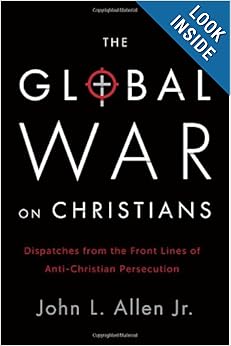
The Global War on
Christians by John L. Allen Jr.
This new book, The
Global War on Christians, written by Senior Correspondent for the National
Catholic Reporter, John L Allen Jr, is a riveting account of the global
persecution taking place against Christians throughout the world. Be warned, this account is a stomach turner
at times with the brief retellings of the details of persecution activities. Yet, what is to be commended about the book
is the degree to which John references the global scope of persecution, for we
often think violent measures are taken in a few militant Muslim countries
against believers. This book is a record
of the front lines of persecution from all over the world, including stories
from recent converts.
The first chapter provides a good window into what constitutes
persecution from a mild to dangerous level.
Allen points out specific factors including legal discrimination,
suppression of worship, suppression of conversion to Christianity, and forced
conversion away from Christianity to another belief (30-32). What is quite remarkable about these factors
is that they cover every angle of a person’s life, from the social and
individual to the institutional level.
In some cases, even the government has its hand in squashing any
promotion or continuation of the Christian faith. Some of the reasons that Christians are
targeted are because of their opposition to immorality crime, their
non-violence insistence, and the fast paced growth of it its members.
The rest of the book is a catalog of injustices starting
with Africa, a section on myths, and social and political fallout. The most illuminating section for me was the
part about understanding the myth that it’s all about Islam. Allen counters this idea by looking at how
Christians are persecuted by totalitarian states, radicals from Buddhist and
Hindu sides, and secular nationalists.
Allen indicates that, “In November 2012, radical Buddhists in Myanmar
prevented humanitarian groups such as Doctors Without Borders from delivering aid
to Muslim refugees in the western part of the country, and the same sort of
hostility often befalls the country’s Christian minority.” (206) Places where Christianity is unwelcome or
which people perceive that the presence of Christians means Western imperialism
are all over areas like India and Southeast Asia. The myth about blaming Islam is toxic because
it furthers the clash of civilizations motif that is heard and is an incorrect
diagnosis to the main features of persecution worldwide. Each event of violence and persecution needs
to be examined carefully on its own terms without regard to prior assumptions. Lastly, as John indicates, “this myth
obscures from view the many examples of noble Muslims who actually risk their
own safety to defend endangered Christians” (212).
I thought this book was a wake-up call to take global persecution
seriously. In all facets of society, the
persecution of believes is taking place and we must do something about this.
Thanks to Waterbrook/Multnomah for the copy of this timely
book in exchange for an honest review.
Comments
Post a Comment